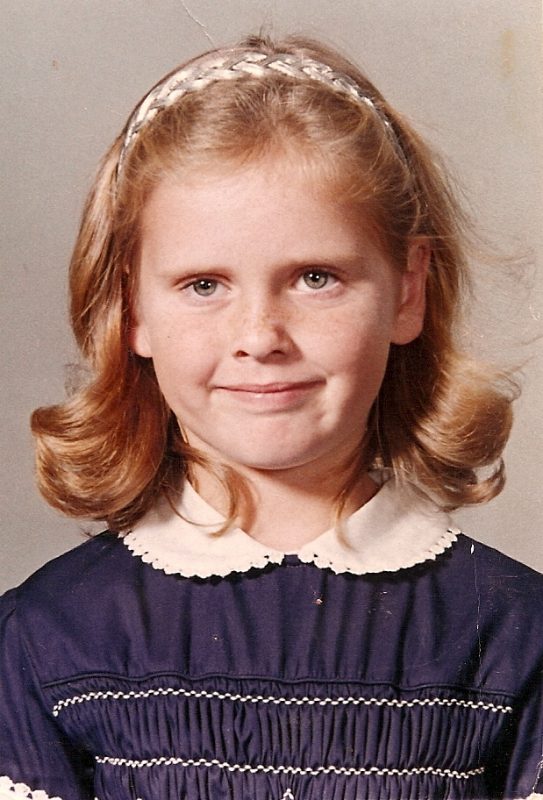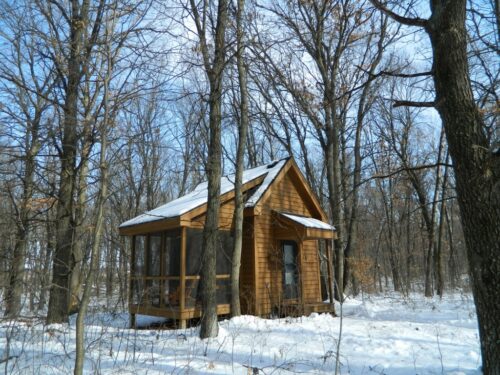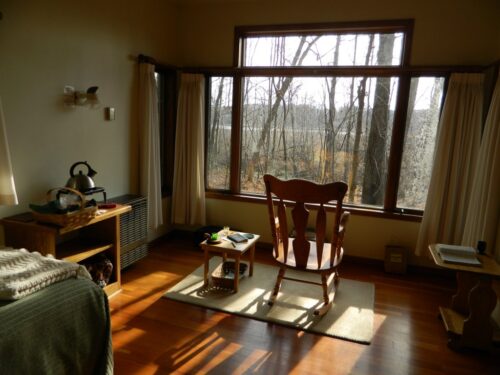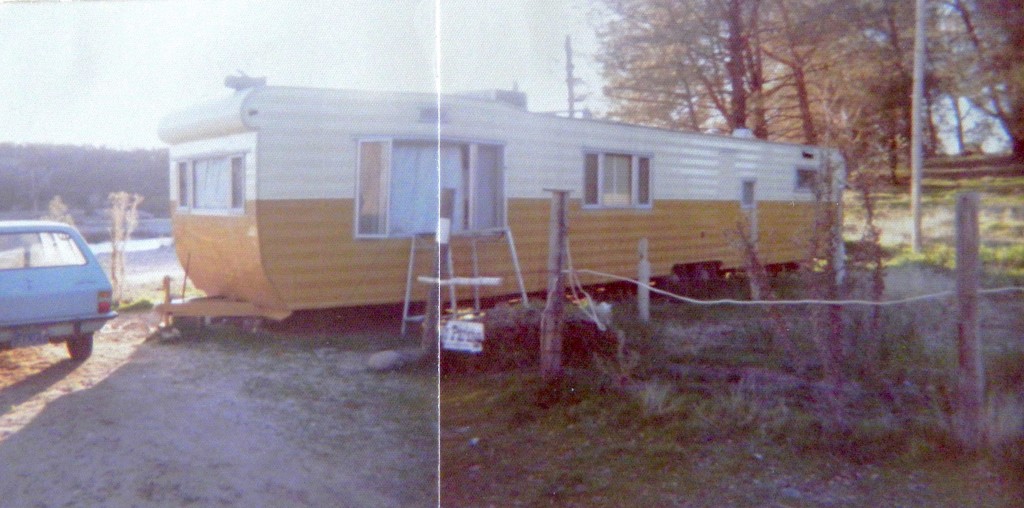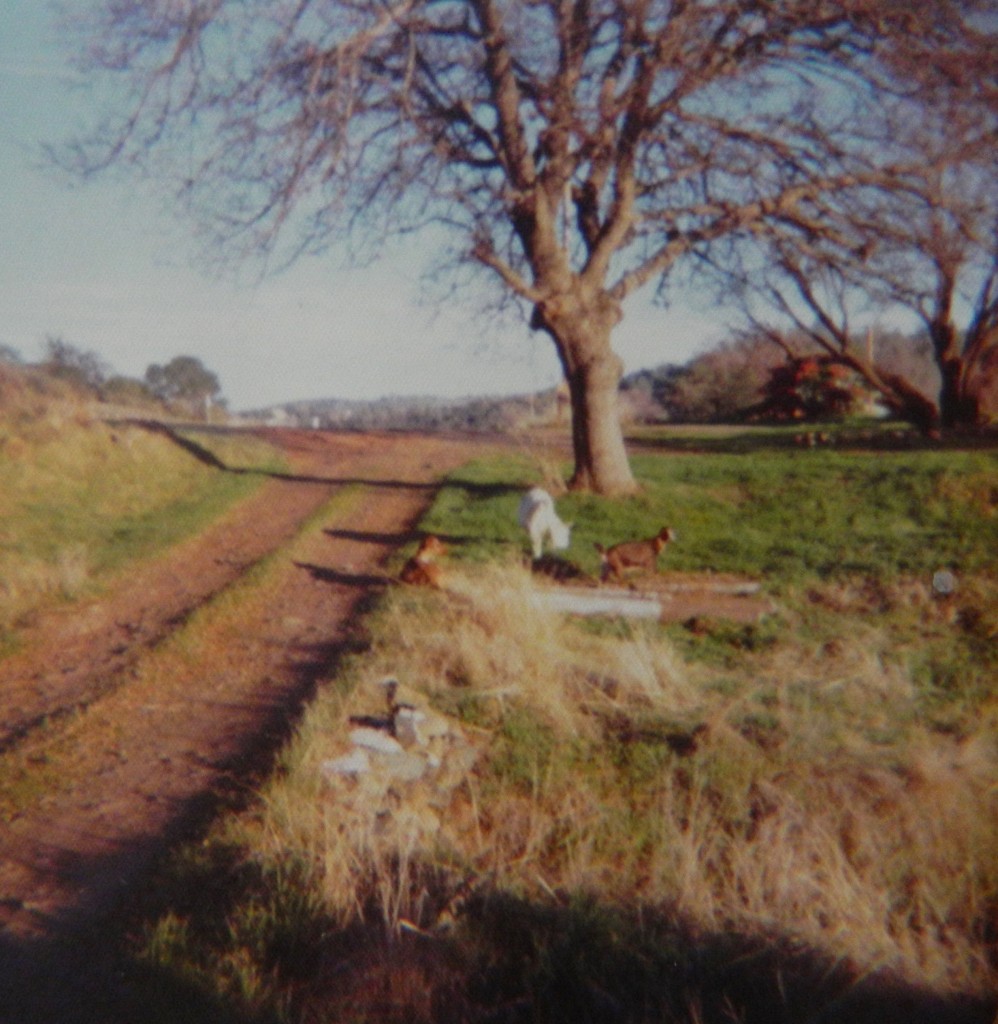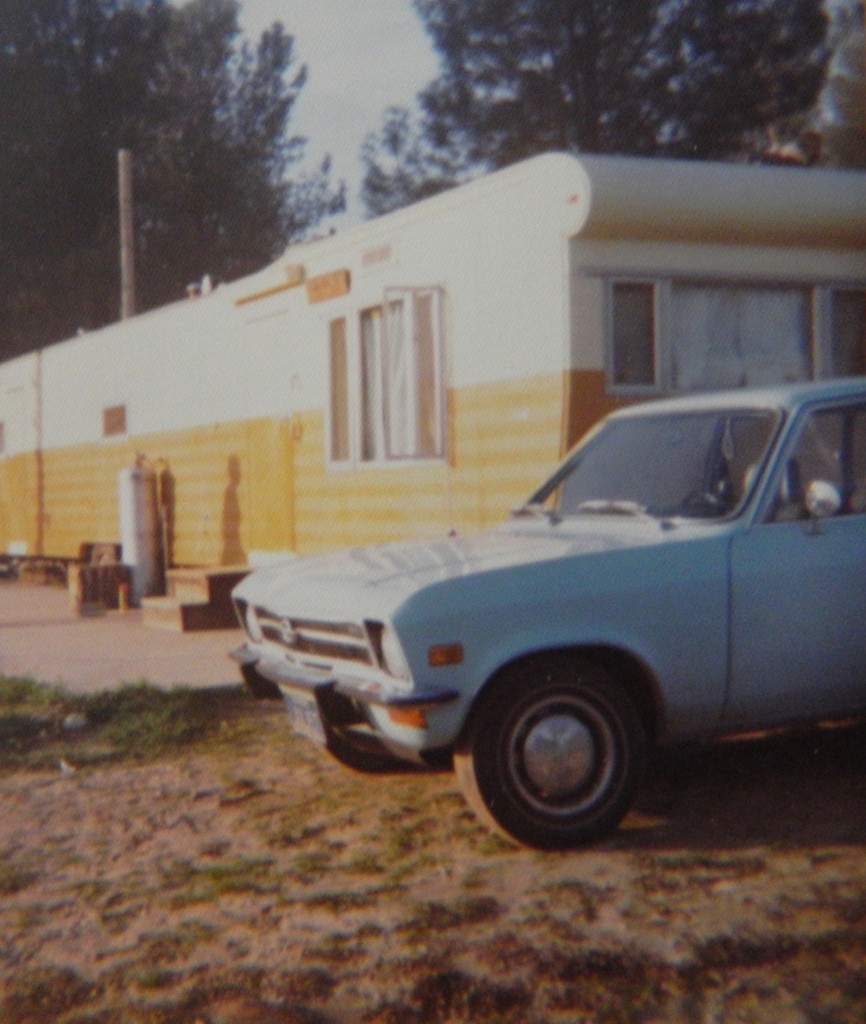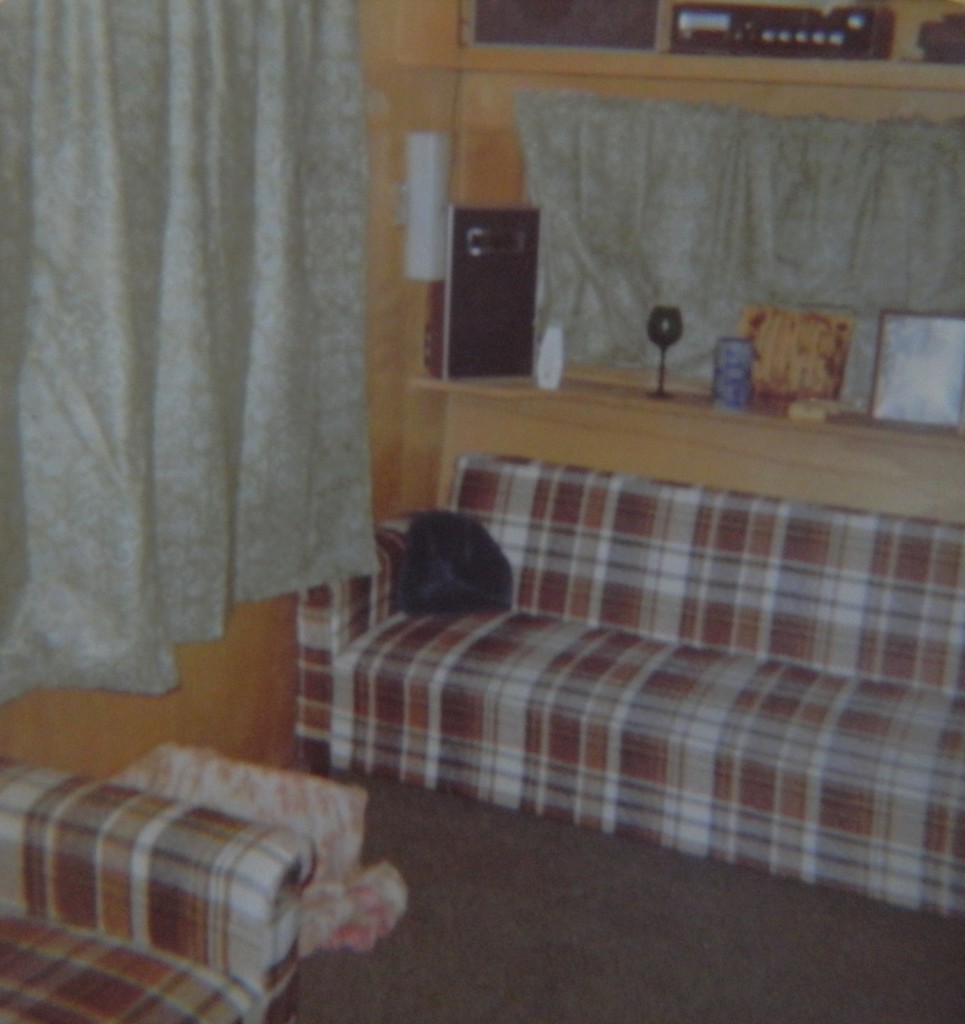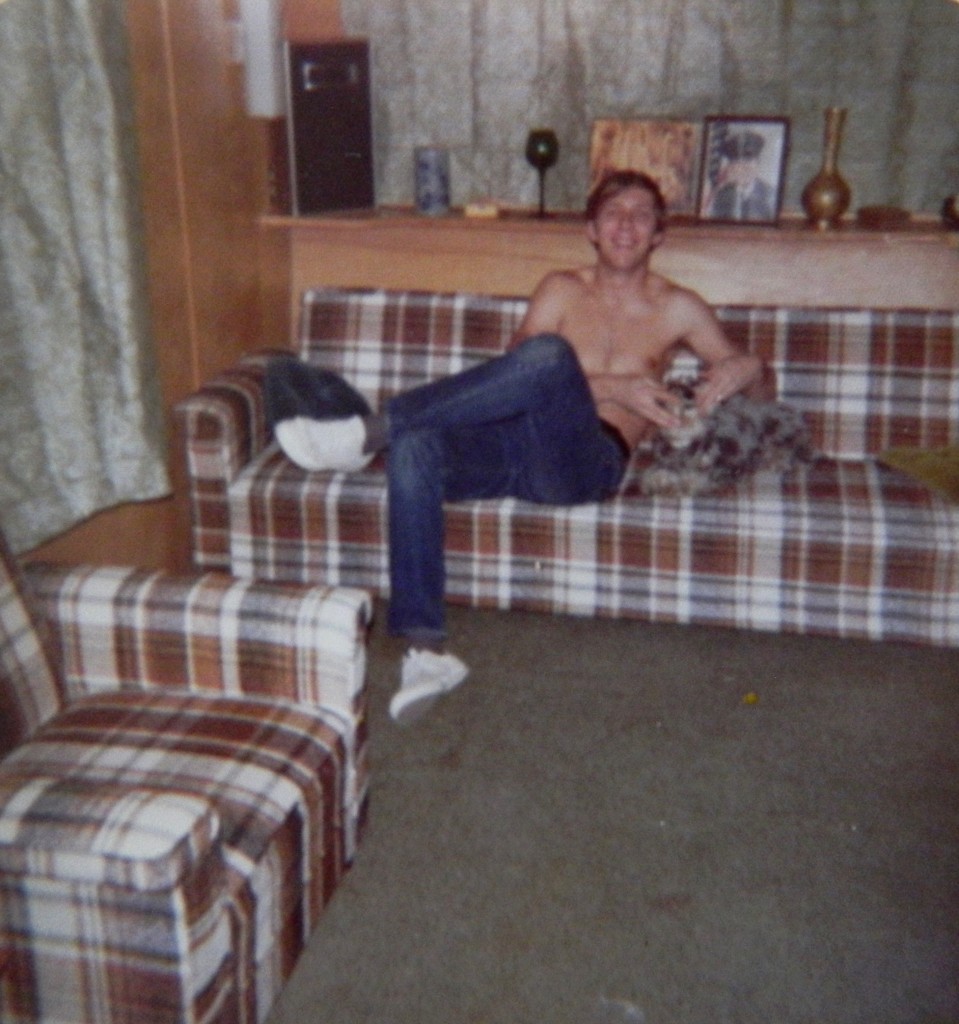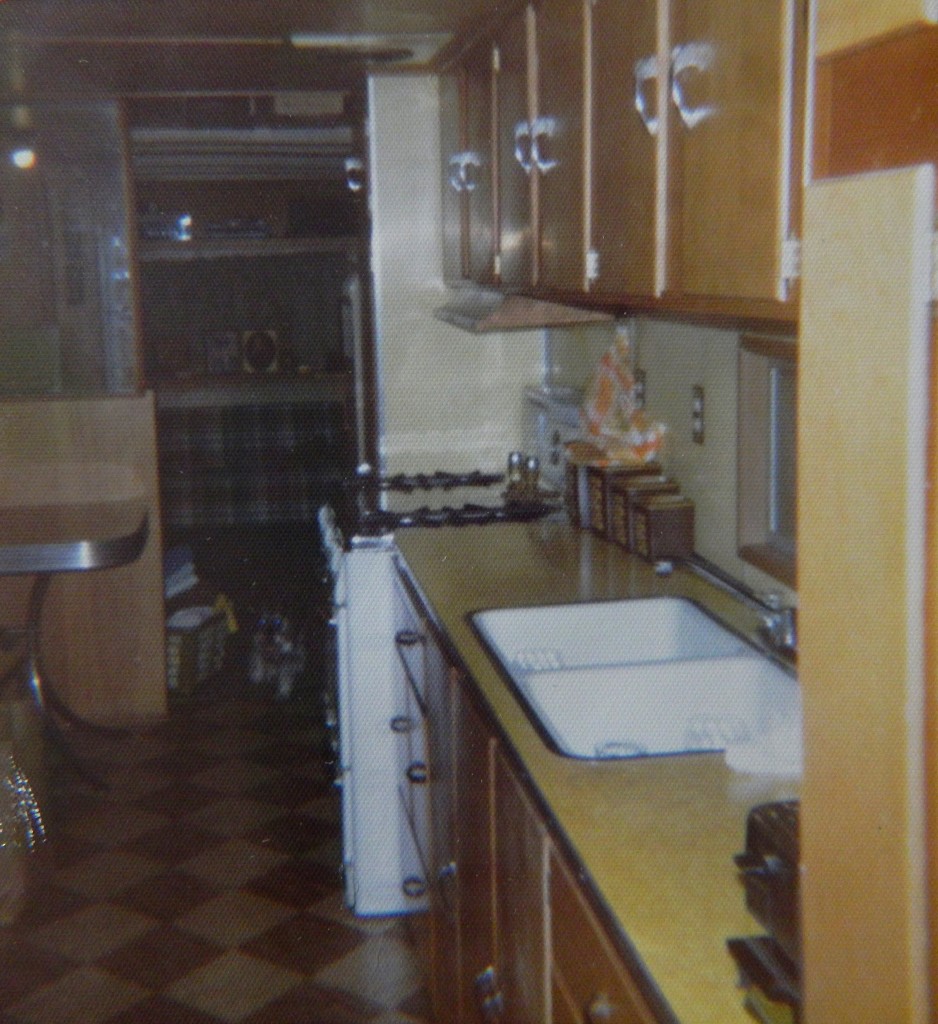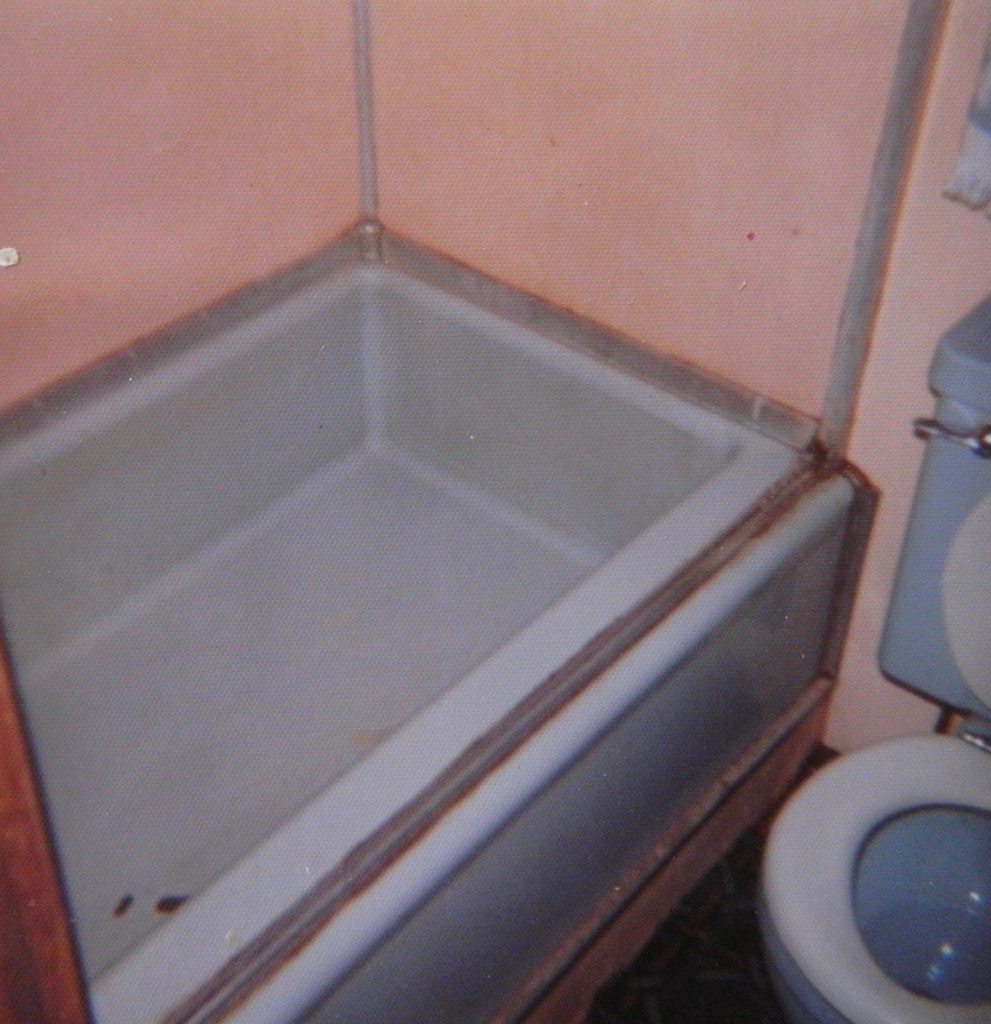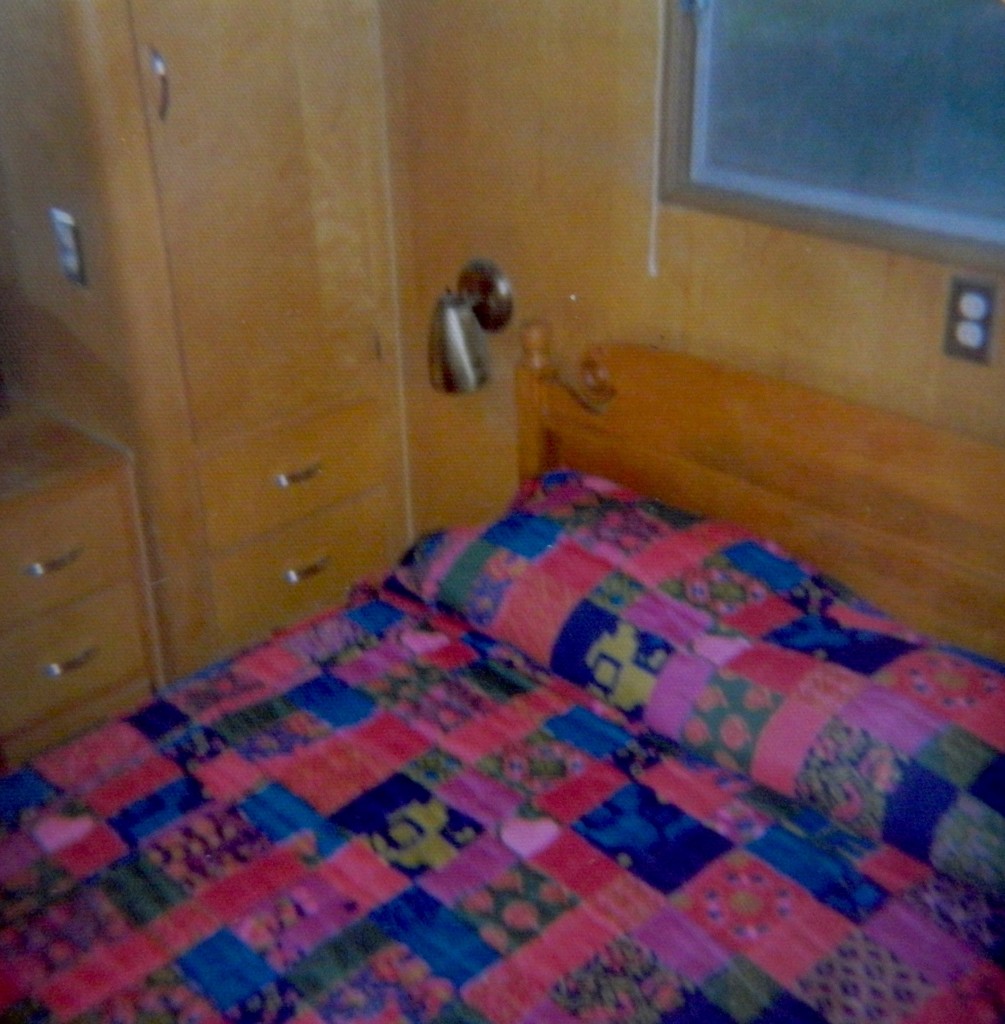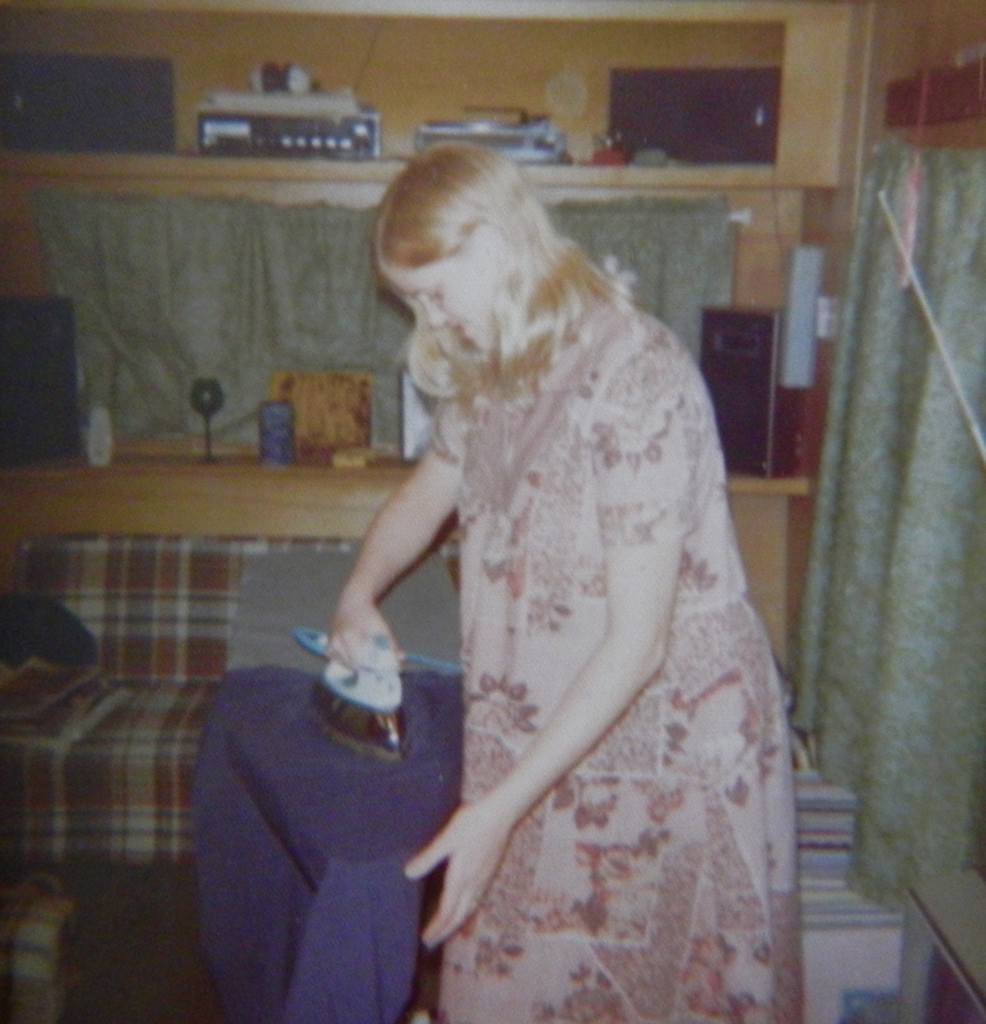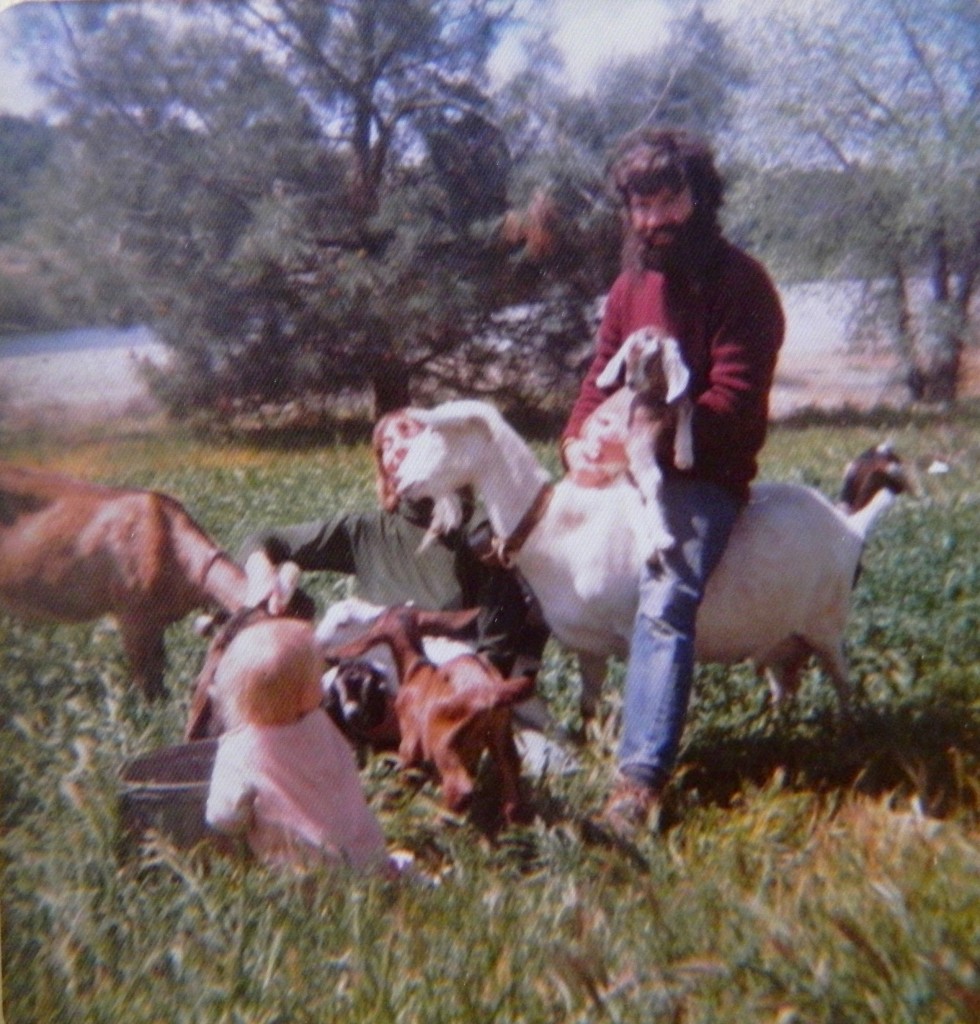Into the Silence — Part 1
April 25, 2021 | My Jottings
It has been 109 months since she has been here. Nine years. She thought it had been seven, but no.
When she returned home she checked the dates in the back of her Bible and frowned slightly, thinking of all that had transpired since her last visit to Pacem in Terris, the Franciscan silent retreat center in the east-central Minnesota woods. The sale of a big house. The move into a smaller one closer to Lake Superior. The rapid decline of her beloved’s health. The hallucinations and delusional thinking that broke everyone’s heart who loved him. The hopelessness. The joyous birth of three more grandbabies. The utter despair in which she’d been engulfed, as she moved her husband to a skilled nursing facility an hour north, near the shore of the Inland Sea. The sense of failure. And Michael’s last week on earth, his last smile at her, the funeral, the burial. The new house with few memories that seemed to mourn silently with her because he would never walk there, lie there, sing there, laugh there, hug there, again. The transformation of her bedroom into a cocoon, where she retreated each day in hope that the stillness and nothingness would one day break open and lightness and color might emerge. The death of a precious granddaughter. The love and kindness and beauty of her grown daughters. The reluctantly attended grief support group for seniors. The surprise, the camaraderie. The edge of pain’s knife becoming duller. Nearly five years later, a new marriage. A kidney donation. Cataracts, crooked fingers, cpaps, creakiness, calm, yes, and contentment.
So much has happened these nine years.
She last came with her sister-in-law Christy in March of 2012, when there was still snow in the oak woods surrounding the sixteen little hermitages. They were a few hundred yards apart; each stayed silently in their own cozy cottage, asking God to show them how to walk the coming years out.
She arrives at 11:00 a.m. on a Friday, checks in at The Big House, gets the key and hands over her two bags to the staff who drives them back to her hermitage porch. He asks if there’s any prayer intention she has for her stay and she answers instantly, “Yes, for the well-being of my family.” That’s always it, anyway. Three daughters, two sons-in-law, ten grands. And Michael’s two daughters who have shown her such love, who bring tears to her eyes… their husbands, their children, their concerns. The whole family’s spiritual, familial, physical, emotional, marital, vocational and mental well-being are there in every prayer of every day. They bow their heads and pray in the parking lot, asking for what always lays on her heart. In the name of the Father, and of the Son, and of the Holy Spirit. Amen.
She knows the way to the hermitage even though it’s been nine years and she’s never been here in the spring. She walks up the dirt paths winding through the winter-bare woods, past the grass prairie with the huge wooden cross at the far edge, past the first hermitage named after St. Michael the Archangel. Her eyes gravitate to the evergreens in among the tall oaks, and she reaches out to grab a few long needles of a white pine so she can smell what she thinks is the most heavenly of all scents.
The woods are just budding and there aren’t visible leaves yet; she can see part of the wooden siding of St. Peter and St. Paul, then St. Anthony the Hermit and St. Mary Magdalene. She stayed in St. Mary Magdalene in November of 2011, aware of her sin and her inability to put it to death herself. She wanted to be in a place named for a woman who knew the delivering power of Jesus, and was the first one He spoke to after He rose from the grave.
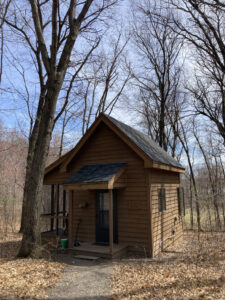 She can see her brightly colored Vera Bradley bag on the porch of St. John the Beloved, and feels a flutter in her chest about the two days and two nights ahead, where she believes Jesus has called her to be alone with Him, in a tiny cabin named for the disciple known for how loved he was, and how much he learned to love because of his Savior.
She can see her brightly colored Vera Bradley bag on the porch of St. John the Beloved, and feels a flutter in her chest about the two days and two nights ahead, where she believes Jesus has called her to be alone with Him, in a tiny cabin named for the disciple known for how loved he was, and how much he learned to love because of his Savior.
She unlocks the door and steps in, carrying her bags with her. There is the twin bed to the right, against the wall, with a window above and a small crucifix hung above the pillow. The bed has a warm green bedspread, and folded at the foot is a cream colored crocheted afghan. Toward the end of the bed sits an empty book shelf with a gas ring burner on top, along with a shiny tea kettle, where she will make tea a few times a day and hold the mug to warm her hands. She stows her bags on the shelves below. To the left of the shelves is a gas heater on the wall, which she knows will keep the hermitage toasty. There is no electricity.
The grain of the wood floors glow in the morning light. On the opposite wall from the front door is a huge window, almost the entire width of the hermitage, with two crank-out windows on either side. 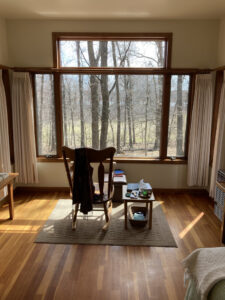 Placed in front of the window is the familiar large wooden rocking chair on a plain rug, with a brown leather foot stool. Next to the rocking chair is a small side table with a votive candle in dark green glass, set in a carrier with a wooden handle.
Placed in front of the window is the familiar large wooden rocking chair on a plain rug, with a brown leather foot stool. Next to the rocking chair is a small side table with a votive candle in dark green glass, set in a carrier with a wooden handle.
Under the table is a woven basket with several items in it. The book Poustinia By Catherine D. Doherty, a couple of suggested prayers, a small zippered pouch with a rosary, a pen, a pencil, a tablet with blank sheets of paper, and the latest newsletter from Pacem, with two testimonies she reads and finds fascinating and inspiring. One is about a high school hockey coach who has stayed at Pacem in Terris eighty times, and considers his silent times there some of the most instrumental in his Christian life. Another is about a Special Education teacher who felt the Lord asked her to commit coming to retreat there every quarter, and she has done that, joyfully, for decades. She says the Lord spoke like a thunderbolt to her, “A different life is possible for you,” and indeed that was the beginning that made the difference.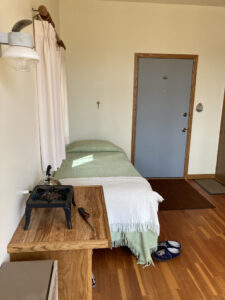
To the left of the chair against the wall is another small table, with a good-sized open Bible placed upon it, a votive candle in amber-colored glass set in an intricate gold stand, two photo icons hung above, and a large wooden cross on the wall.
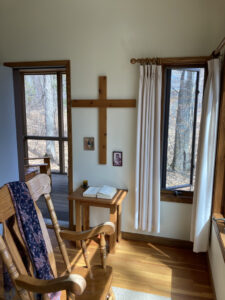 On the opposite wall from the bed and the shelving with the gas ring, is a tall cabinet with two doors and many well-stocked shelves inside. They think of everything. She surveys the things she’s seen before… a rain poncho and umbrella hanging on a horizontal pole. A broom, dustpan, dry mop. A beautiful carved walking stick. A knife, fork, spoon, metal plate, cup and bowl, and a dark green ceramic mug with the Pacem logo. A diminutive sewing kit, a first aid kit, dish soap, disinfectant spray. An extra long handled lighter for the candles and gas ring. Writing materials. A laminated map of the trails and locations of the hermitages and outhouses. A flashlight, extra batteries, and a bottle of holy water to put into the tiny ceramic font that hangs on the wall to the right of the door. An extra pillow and blanket. An extra set of sheets, towel and washcloth. A slotted wooden box with single-serve coffee bags, Lipton tea bags, powdered creamer, sugar and stevia. A checklist hangs on the inside of the closet door to help each hermit know how to make the hermitage ready for its next occupant.
On the opposite wall from the bed and the shelving with the gas ring, is a tall cabinet with two doors and many well-stocked shelves inside. They think of everything. She surveys the things she’s seen before… a rain poncho and umbrella hanging on a horizontal pole. A broom, dustpan, dry mop. A beautiful carved walking stick. A knife, fork, spoon, metal plate, cup and bowl, and a dark green ceramic mug with the Pacem logo. A diminutive sewing kit, a first aid kit, dish soap, disinfectant spray. An extra long handled lighter for the candles and gas ring. Writing materials. A laminated map of the trails and locations of the hermitages and outhouses. A flashlight, extra batteries, and a bottle of holy water to put into the tiny ceramic font that hangs on the wall to the right of the door. An extra pillow and blanket. An extra set of sheets, towel and washcloth. A slotted wooden box with single-serve coffee bags, Lipton tea bags, powdered creamer, sugar and stevia. A checklist hangs on the inside of the closet door to help each hermit know how to make the hermitage ready for its next occupant.
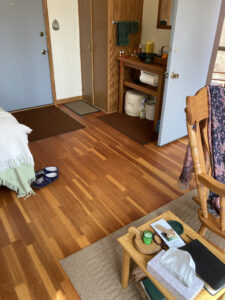 Next to the tall closet is a wash table, wooden and waist high. A bottle of liquid hand soap sits next to the same sized gel disinfectant. There’s a framed mirror hanging on the wall above the shelved table, and a towel rack with a forest green towel and washcloth are affixed to the left on the side of the closet. A roll of paper towels hangs under the table, and three gallons of delicious spring water sit on the floor.
Next to the tall closet is a wash table, wooden and waist high. A bottle of liquid hand soap sits next to the same sized gel disinfectant. There’s a framed mirror hanging on the wall above the shelved table, and a towel rack with a forest green towel and washcloth are affixed to the left on the side of the closet. A roll of paper towels hangs under the table, and three gallons of delicious spring water sit on the floor.
She knows what will be in the basket on top of this wash table because she has savored the feast before. 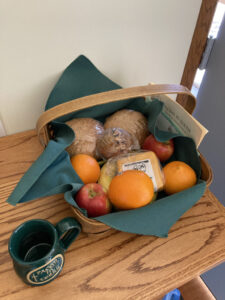 Two loaves of home-baked whole wheat and oat bread, small boules slightly bigger than softballs. Three navel oranges. Two apples, two bananas. A block of parotid-activating mild cheddar cheese, and one good-sized whole wheat bran muffin with a little valley of gooey date mixture splitting the top, and three toasted walnuts filling that valley.
Two loaves of home-baked whole wheat and oat bread, small boules slightly bigger than softballs. Three navel oranges. Two apples, two bananas. A block of parotid-activating mild cheddar cheese, and one good-sized whole wheat bran muffin with a little valley of gooey date mixture splitting the top, and three toasted walnuts filling that valley.
She unpacks her Bible and journal and places them on the table next to the rocking chair. She moves the box of Kleenex from the closet to the table too, knowing she will probably need to open the second box before she leaves for home on Sunday.
She takes off her hiking boots and puts her Acorn slippers with the quirky embroidered moose on her feet, wincing as the swollen, broken toe is brushed. She takes off her long black cardigan and opens two windows to let the breeze blow through. The woodland scene outside is calming. The forest floor is thickly carpeted in a layer of dried, golden oak leaves. The glint of the shallow lake a few hundred yards away shows through the bare trees. The drumming of a woodpecker, then its echoing call. Squirrels keeping busy, putting their whole faces beneath the leaf cover to look for a stash, then running off to do the same at another seemingly random spot.
She pours a cup of water, then opens the side door of the hermitage to step out to the screened porch with the wooden Adirondack and matching footstool. She sets her bottle of Stok cold brew, the Organic Valley half and half, and the Torani hazelnut coffee syrup on the porch, knowing it’s the coolest place for them. 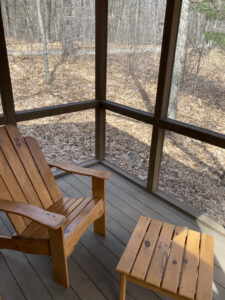 Remembering her one lone and struggling kidney christened Verna, she drinks the metal cup of water down as she stands on the porch and feels the chill that helps her decide to go back inside.
Remembering her one lone and struggling kidney christened Verna, she drinks the metal cup of water down as she stands on the porch and feels the chill that helps her decide to go back inside.
She has brought her Community Bible Study lesson with her, and settles down in the rocker with it open on her lap. John, chapter 21. Jesus appears to some of His disciples and makes a simple breakfast for them over a charcoal fire. She wonders if Peter remembered when he last spent time near a charcoal fire. One scene was of his denial and shame, the other of restoration and fellowship, and Christ’s sober prophecy about where Peter would ultimately end up.
There are scenes of denial and shame in her memory as well. Lord Jesus, will you come and sup with me too? Will you prepare me for what is to come, and help me live out my days in joy and obedience to you? Will you strengthen, heal, and protect my family? Will you do the same for me? Here I am, Lord.
She reads, turning pages and pages. She writes, praying over what might begin to shimmer there. As the day wanes and the sun goes down, she gets up to close the windows and turn up the wall heater’s thermostat. Its comforting clicking commences, and in minutes the hermitage is delightfully warm. It’s supposed to be 35 degrees tonight. Perfect for sleeping. She pours water into the kettle for tea and sets it on the gas burner, turns the knob and hears the whuff as she holds the lighter underneath and the blue ring of flame spreads. She peels an orange and marvels at how miraculous it tastes, having come from a simple basket delivered to a tiny hermitage in the woods where she is being prayed for by the dedicated staff. She lights the candles. She writes in her journal all the names she always does, plus more. Chris. Sharon. Cullen. Eleanor. Margaret. Louisa. Jeremy. Carolyn. Clara. Elijah. Vivienne. Audrey. Miriam. Hannah. Levi. Sara. Bob. Buffy. Emma. Bryce. Joe. Daphne. Jordan and AJ. Josie and Robbie. Friends near and far.
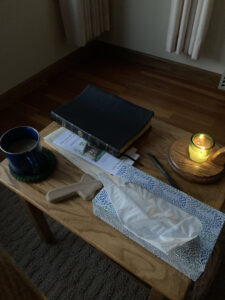 She puts down her journal on the side table. Brushes her teeth at the mirror, rinses her toothbrush with occasional splashes from the jug. Washes her face with the leftover warm water in the kettle, and gets ready for sleep. The little digital clock in the closet says it’s 8:30 p.m. but she thinks with the dark and the circumstances she’ll doze off quickly.
She puts down her journal on the side table. Brushes her teeth at the mirror, rinses her toothbrush with occasional splashes from the jug. Washes her face with the leftover warm water in the kettle, and gets ready for sleep. The little digital clock in the closet says it’s 8:30 p.m. but she thinks with the dark and the circumstances she’ll doze off quickly.
She does not. She is awake for hours, thinking of each loved one, all the needs, her own drifting days. She thinks of the baby eaglets being tended in their nest in Decorah, Iowa, and how blissfully unaware they must be of all things COVID. How their parents care for them and feed them and warm them, and how they grow and sprout new spiky feathers every day, fantastically visible via a live webcam. How one day they’ll grow featherpants too.
She pictures how they’ll look when they finally sit on the edge of that massive, intricate nest and take their first flights. She wonders what that would feel like and wishes she would have another flying dream. She has had only one in her life, and it was wonderful. She remembers that her old friend Leslie has flying dreams regularly, how in her sleep she can just tell herself to have a flying dream, and then she runs and takes a little leap, and off she goes up into the sky, at will.
A Momentous Year
April 19, 2021 | My Jottings
The year I turned seven was a momentous year in my life. In good ways and in bad, 1964-5 shaped my youth in ways that still affect me today.
This is my second grade school picture from Workman Avenue Elementary School in Southern California. I was in Mrs. Lokken’s class. Several really important things happened there.
First, I learned that contrary to what my parents had been told by Mrs. Weber, my first grade teacher, I did indeed have some academic potential after all. Who knew? Apparently not Mrs. Weber. I still have all my report cards from elementary school. I keep them in a file that’s labeled “report cards” in my filing cabinet. In first grade I got straight C’s. In second grade I got mostly A’s and a few B’s.
Secondly, I learned from Mrs. Lokken how crucial it is to enthusiastically blurt out “Rabbit!” to random people on the first day of every month (before they say it to you first), so you’ll have good luck the rest of the month, and presumably the random people won’t. I’m in my fifties now and our family still works hard at this undertaking. My husband Michael has been known to lay awake until the stroke of midnight on the first of the month, then gently nudge me and put his lips next to my ear and whisper wickedly, “Rabbit!” before he chuckles and then rolls over and goes to sleep. I am not making this up. My daughters try to rabbit me before I rabbit them, and I of course I try diligently to get them first. Texting has come in very handy with rabbiting. I sometimes text RABBIT! to Sharon, Carolyn and Sara very early in the morning on the first day of the month. My sons-in-law halfheartedly participate in this activity, all because I learned this life skill when I was seven years old, in Mrs. Lokken’s second grade class, in the momentous year of 1964.
Thirdly, I lost my two front teeth in the second grade, and actually let the insensitive nice man photographer influence me to smile with my mouth closed. I had never smiled like that before. For a long time after that I was self-conscious about my teeth and hated my smile. Then a few years later my parents spent thousands of dollars on 1) head gear, 2) braces, 3) a retainer, and 4) myriad orthodontist appointments, and after I heard “we’ve spent thousands of dollars on your teeth!” more than a few times, I decided to start liking my smile better.
Fourth, in the second grade I met my friend Denel. She was in Mrs. Lokken’s class too. She and I were the best of friends for years. I wrote about some of our childhood antics here. Denel still lives in Southern California and in 1981 I moved to Northern Minnesota, but we still keep in touch, pray for each other, and call each other “my dearest oldest friend.” We still try to rabbit each other too. When I was seven years old in 1964, only God knew that I would gain a treasured friend whose love and faithfulness would span my entire lifetime. Forty-five years is a long time to have a friend.
Also when I was seven years old, I had not yet eaten an egg, a bite of cheese, a green vegetable other than iceberg lettuce, or even a sip of any kind of soup.
While 1964 was an eggless, cheeseless, fiberless, soupless year in my life, thankfully it did not turn out to be completely brainless, smileless or friendless.
Or rabbitless.
Reach back into your memory and share something that happened to you in 1964!
We Are Minnesotans
April 7, 2021 | My Jottings
When I was twenty-three years old (many, many moon ago), I moved from The Golden State to The North Star State. From the ever-sunny, densely populated, smoggy, southern part of California, to the mostly wintry, wide open, lake-strewn northern part of Minnesota. There are almost twice as many people in Los Angeles County, where I was born and raised, as there are in the entire state of Minnesota, where I’ve been lovingly tended and have now grown old.
In California we had fresh strawberry stands on the sides of the roads and my mom bought “flats” of them often. In Northern Minnesota the growing season is so short we all believe berries are like ruby-colored treasure, and we get excited if we have any kind of berry pie or shortcake. In California if we ever ate anything just thrown together and baked (basically almost never), it was called a casserole; here in Minnesota we call it hotdish. Not a hotdish. Just hotdish.
When I moved here, I wanted enchiladas in no time, but my native Minnesotan husband hadn’t heard of such things. He suggested we drive through Taco John’s, which was not the authentic Mexican food I was accustomed to growing up so close to the border. Early in our marriage I invited my in-laws over for homemade tacos, and neither had ever eaten a corn tortilla, much less one perfectly folded and fried in hot oil to serve as the heavenly and moan-worthy vessel for meat, salsa, sour cream, onions, lettuce and cheese.
Of course my first winter in Duluth was record-breaking, with weather that made the front page of The Duluth News-Tribune and Herald, and had me calling my mom in temperate Morro Bay, California to urgently tell her, “It’s 27 degrees below zero.” And two nights later, “It’s 34 degrees below zero.” And the next night, “The wind chill is 65 degrees below zero.”
“How does your house stay warm?” Mom wondered, slightly alarmed. “Are you keeping blankets wrapped around you at all times?” Our furnace in SoCal was the size of a Christmas tree box and it fit in our hall closet; no one ever gave it a second thought. I learned quickly that furnaces in NoMin are metal octopus-like behemoths that lurk and roar and blast in dark basements, and actually keep houses quite warm when it’s 34 degrees below zero outside. Or colder. We didn’t actually have to wear blankets in the house. But we did have to dress “in layers.” Instead of my usual cut-off Levis, halter tops and sandals, my husband Michael instructed me in wise and warm dressing for the Northwoods. Turtlenecks, wool socks, lined Sorel boots (and later Steger moosehide Mukluks which I still wear — see here), Thinsulate mittens (never gloves!), scarves, down-filled jackets or parkas, but I drew the line at long underwear. Michael wore them since he worked outside a lot, but I never did.
That first winter tested me. I had married a man I’d only met once, left behind family, friends and balmy weather and moved to what I still call American Siberia. It took me a while to make friends and learn to live in a part of the country that had snow on the ground from October until May, but it only took me two weeks to get pregnant with my third child. I made my own enchiladas and got a good recipe for a hamburger and wild rice hotdish which tasted pretty good.
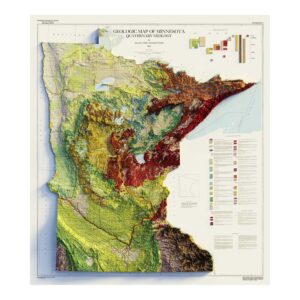 After a couple of years, the rhythms of Minnesota, her seasons and people, became my rhythms, seasons and people. I loved the changing colors of the leaves in the fall and made pumpkin bars and harvest soup. I stopped feeling that mild dread when winter blew in, and learned to love the comforting fires in our hearth, the piles of books from our little neighborhood library, and the smell of my homemade whole wheat bulgur rolls wafting through the house almost weekly.
After a couple of years, the rhythms of Minnesota, her seasons and people, became my rhythms, seasons and people. I loved the changing colors of the leaves in the fall and made pumpkin bars and harvest soup. I stopped feeling that mild dread when winter blew in, and learned to love the comforting fires in our hearth, the piles of books from our little neighborhood library, and the smell of my homemade whole wheat bulgur rolls wafting through the house almost weekly.
I never took up gardening like so many Minnesotans do, but spring always felt like we were emerging from a dark cave, and I learned Michael wasn’t exaggerating when he assured me my blood would “thicken” as time passed. My thick blood became apparent to me as I walked down the streets of downtown Duluth in sandals and a sleeveless denim shift one early spring morning before I noticed the temperature on the marquee of the bank said 26 degrees. I drove home immediately and sat and pondered what had just happened. No wonder people passing me on the sidewalk gave me second looks.
I grew up in Covina, California, and we used to have to drive two hours to the mountains to see snow, to spend a day sliding down a slope on red metal disks with white canvas handles. Seeing mountains is probably the only thing I really miss, living here. After a Southern California rain which cleared the smoggy air, Mt. San Antonio, or Mt. Baldy as everyone really knows it, was always visible from wherever we were. When it was covered with fresh snow, I always took time to stare at its beauty, even as a child. Here’s what a view of Mt. Baldy looks like from Los Angeles.
 Now that I’m close to retirement age, I think about ways to get out of the cold in the winter time. Lloyd and I have talked about visiting different places in January, maybe northern Arizona, maybe North Carolina. I don’t ever want to move away from Northern Minnesota, because it’s too beautiful. Life is too lovely here to move away completely. But getting away for a couple of weeks in the darkest, coldest month is a strategy many Minnesotans use that enables them to stay in the state they love.
Now that I’m close to retirement age, I think about ways to get out of the cold in the winter time. Lloyd and I have talked about visiting different places in January, maybe northern Arizona, maybe North Carolina. I don’t ever want to move away from Northern Minnesota, because it’s too beautiful. Life is too lovely here to move away completely. But getting away for a couple of weeks in the darkest, coldest month is a strategy many Minnesotans use that enables them to stay in the state they love.
Last Sunday after our Easter time was over, two precious granddaughters stayed to spend the night with me. Louisa got a tubby in Grandma’s deep, fancy tub. They got in their jammies, had snacks, did cartwheels, giggled together, drew pictures of dogs, and wanted to sleep next to each other on pallets made of blankets in front of the bedroom fireplace. I read two delightful books to them, and Audrey in particular listened so attentively to each word, eyes never straying from the illustrations. Here’s one book, and here’s the other.
After they finally settled down and fell asleep, I set my phone alarm and tried to snooze myself, but struggled to sleep well. Maybe it’s because I knew we’d have to be up early to get ready for school.
I woke them up earlier than they are used to, in steps. First I turned up the heat, and clicked on the fireplace, so a cheerful little glow would be the first thing they’d see. Then I opened the curtains of one window to let in a bit of the dawn. Then I put some soft music on from my phone. I took their toothbrushes out and set them on the bathroom counter with toothpaste. I said “Good morning girls,” but no one stirred. I bent down to rub their backs under the thick down comforter, and finally saw signs of life. I asked them to get dressed and told them what time breakfast would be ready, and went to the kitchen to get things started. I turned on the gas fireplace in the dining room so they’d have warmth at their backs as they ate, while the house was warming up. I made scrambled eggs (sloooowwww is the way to go on these), toast, and chicken and sage sausages, and the girls were ready and calmly at the table in time. They both thanked me for the food, and went off to brush their teeth and hair before grabbing their things and heading down to the basement and to the car (christened Hubble) in the attached garage.
We drove Louisa to school first, and as she got out of the car I reminded her how much I love her, asked her to do her best in school, and told her that even though she can’t see Jesus with her eyes yet, He is right there with her, all throughout her day. On the way to Audrey’s house (she goes to Catholic school so the day after Easter was a holiday for her), we drove up on Hawk’s Ridge, overlooking Lake Superior in all its glory as the morning sun assured me that, yes, I could trust God again on this day. 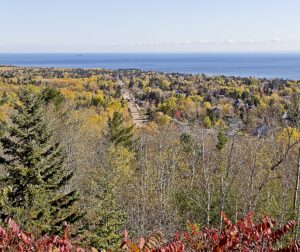 The photo was almost our exact view, except it was taken in the fall and later in the day.
The photo was almost our exact view, except it was taken in the fall and later in the day.
I told Audrey how when I met Grandpa Michael for the first time in 1981, I flew from Los Angeles to Minneapolis, and he drove me north to meet his family for a few days. His mom Bernie came out of the house as we drove up the driveway and parked, and held out her hands toward me and said reverently and in a hushed voice, “You look just like the Blessed Virgin!” That memory is funny and dear to me, now that Michael’s parents are gone too soon from a terrible car accident.
The second day I was in Duluth, Michael drove me up on Hawk’s Ridge to see Lake Superior and I gasped, asking, “What is that?!” I’d had no idea it would be so vast, so sweeping and spectacular. It looked like an ocean. Now, forty years later with Michael gone on ahead of us to heaven, I know this Lake is our treasure. We drink the exquisitely delicious water every day, we give thanks for its cooling power in the middle of summer, and we watch the 1000-foot ore boats coming and going all during the shipping season. Because of God’s provision and kindness, I get to see this Great Lake from the windows of my home every day.
We watched the sun rise a little higher and then I drove Audrey home, called her Beauty as I always do, and watched her run in her back door to join her five siblings and parents.
When I return to Southern California now, it seems like a foreign country to me. So many trees are gone. People have removed the green grass and paved their front yards to park numerous cars. Windows on normal residential houses have iron bars on them. Schools are gated and locked. And the traffic….
If you’ve visited my blog much, you know I love to look back at my formative years in Southern California. It was a splendid place to grow up, surrounded by orange tree groves that made the gentle breezes smell like paradise, bordered by the mighty Pacific Ocean on one side and the San Gabriel Mountains on the other, where nearly constant sunshine gave me freedom and opportunities to run and play and swim.
But now I am a Minnesotan. My people are Minnesotans. I’ve embraced Minnesota culture with everything in me. I love how people here say, “Oh fer cute!” and “Do you want to go with?” and “Nice day, ay?” and “Uff-da!” There are few swimming pools here, no roadside strawberry stands that I’ve ever seen, and my furnace would never fit into a hall closet. I no longer have to drive two hours to see the snow, or 45 minutes to see a huge body of water.
Here in the North I’m never far from a stealthy wolf, a massive moose with nostrils you could fit your fist into, an undulating fisher pursuing a mouse, a gliding muskrat, or a flashy cardinal perching low on a lilac bush. I like hotdish, walleye, keep my Kahtoola nanospikes near my shoes six months of the year, store a blanket and a first aid kit in the back of my Outback, and am one of the few people in the state who doesn’t, alas, own a cabin.
I love to travel, and hope to do more of that before I die. There are so many places I’d love to experience. Switzerland. Israel. England and Scotland again. Ireland. Norway.
But I feel so very blessed to live here in this grand northern state full of water and wildlife and trees.
Just some rambling
April 3, 2021 | My Jottings
I am alone in the house. That almost never happens. I love it. My dear foster resident is at her parents’ house overnight for Easter. My youngest daughter Sara is at a wedding. Lloyd is at his north woods cabin and will be joining his daughter and her family at their lake cabin tomorrow for Easter.
It’s sixty-nine degrees out and I think when I finish this post I’ll take a walk down by Lake Superior.
I spent the day in the most exquisite state of not rushing around, not meeting anyone else’s needs, moving quietly and slowly. Not like in slow-motion, in case you were picturing me doing that, haha. I scrubbed and baked a pile of huge russet potatoes, took them out of the oven one by one and held them in my mitted hand while I scooped out the soft steaming innards. I mixed the hot potatoes with grated colby and jack cheese, parmesan, chopped green onion, blue cheese dressing. Then I took my bare, clean hands once everything had cooled sufficiently and pressed that cheesy goodness back into the skins. I sprinkled a mixture of sesame seeds, smoked paprika and garlic powder on top. Would you like to see some photos of the whole process? Click here — my daughter Sharon took these pics of me making them since many had asked for the recipe. I make them every Easter.
We’ll be having an Easter meal with typical offerings, I think. Ham from Chris and Sharon, along with a lemony dessert. Homemade bread, deviled eggs and French silk pie from Jeremy and Carolyn. I’m doing the aforementioned stuffed baked potatoes, a chopped salad with a ton of colorful vegetables, and an old family favorite I’ve never made at Easter before — Green Macaroni and Cheese.
There will be sixteen people crowded around our two tables lined end to end. One table has a blue and white runner, one has a blue and white table cloth. Tulips from Sara’s floral studio are already put out in blue and white mugs all along the tables.
After I flash-froze and then stacked and refrigerated the potatoes, I went out on the front deck where the sun bakes the front of the house from morning until evening, rolled my jeans up and put my feet up on the patio table. I read some of Les Miserables as I sat and exposed my vanilla legs to the sun for the first time in many moons. I saw our across-the-street neighbors were taking advantage of the warm weather as they sat under the awning on their front porch. As I read and reclined I wished him the best well-wishing I could from my heart, even though he recently made fun of the way I call our Schnauzer Millie in from going potty. Millie just turned fifteen and is almost completely deaf, and the only thing she can hear are exceedingly high pitched, fairly loud voices. So if she’s dallying too much on the side of the house, especially in the winter, I go out on the deck and call her name in my highest pitched warble. She usually hears me and comes running. My neighbor (who is a very nice guy although we’re not well-acquainted with him) was watching TV and mimicked me inside his house and said, “MILLLLiiieee!” He called in a high and feminine yodel, probably not realizing he could be heard across the street and down some.
I worked on my Community Bible Study lesson, did devotions with Lloyd over the phone, paid a few bills. I opened windows all over the house and let the fresh air blow through. Such a wonderful and invigorating smell! I’m grateful to live in a place where water and air are clean, traffic is non-existent and muskrats swim in nearby ponds and their wakes look like two perfect and diagonal water braids.
My dear childhood friend Denel and I talked for an hour today too. She and her husband have retired to Solana Beach, California, and I was at her home a year ago just as things started to get chaotic with COVID. We talked of our children, our blessings and struggles, the way the Lord reminds us He’s there and attentive to our lives and loves, and how His timing isn’t the thing we love the most about Him.
Another blessing was a phone call with my dearest adulthood friend Su. We had tentatively planned to meet for a quick cup of coffee or tea, either in the cemetery or at Mt. Royal grocery, but it didn’t work out today. Now that she and I have had both of our vaccinations, I hope we can take advantage of it and get together more often. I heard Anne Lamott being interviewed recently on Bob Goff’s podcast, and she talked about how friendships have been so sacred in her life, getting her through the hellish times and reminding her of God’s love. I’m generally not an impulsive person (except when I married a man I’d only met one time and had only known three months through letter writing and phone calls – except for that one little time) but Anne Lamott’s words about picking up a friend in pain and making a Target run together, eating Hershey’s kisses and just being together for a short time, really appealed to me. Let’s just get together for an hour, have some tea and chocolate, and then go back home. Nothing has changed at home, but something has changed in us, because we were together. I think that’s one of the best things about friends.
I’ve had a hard time reading this past year. I read every day, but it has been a long time since I’ve picked up a book to read for hours like I used to do. I hate it. I want that feeling, whatever it is, to go away. I want to sense the inexpressible comfort of settling down into a beautiful read like I used to all the time, all my life. I am slightly encouraged (but only slightly) by hearing that this seems to be a common phenomenon of lock-down. I keep plugging away, reading a chapter here, two pages there, listening to 30 minutes of my latest book on Audible. I guess I should be thankful that I do read 2-3 books a month. My dad used to read five books a week in his retirement.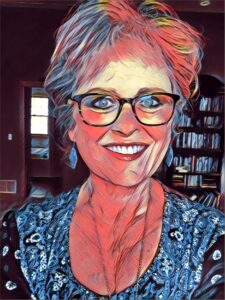
I’ve been working my way through Call the Midwife on Netflix and I love it. Maybe I’ll make myself a cup of Irish tea (Barry’s) tonight and watch the next episode. I’ll get up early tomorrow to make the salad and get the Green Macaroni and Cheese ready for the oven. Everyone will be here at 1:00 p.m. Grandsons will carry extra chairs up from the basement, granddaughters will pour ice water, trays and pans and covered plates will be carried in the parade that comes through my door.
I’ll get to see Cullen the Tall, Eleanor the Deep, Margaret the Cheerful, Louisa the Lover, Clara the Kind, Elijah the Mind, Vivienne the Treasure, Audrey the Beautiful, Miriam the Dear, and Levi the Organizer.
The ones who we miss at our table are Michael the Builder and Hannah the Strong, but our separation is only for a little while.
And to have my three beloved daughters all together with me under the same roof will seem like riches beyond measure. Sharon, Carolyn and Sara. I like to just say their names.
And because Jesus lived on this earth, willingly took on every sin I’ve ever committed as He died on the Cross, then rose again and ascended to the Father, I have hope. I have love. I have His grace, mercy, and help.
May the life of Jesus fill us all,
Preparing for Pacem
March 30, 2021 | My Jottings
In a few weeks I’ll be going to Pacem in Terris. It’s a silent Christian retreat center in the Minnesota woods about two hours south of where I live. I’ve been there four times now, but it’s been a long time since I’ve visited. Nine years, to be exact. Michael was still alive then and was beginning to struggle with Lewy Body Dementia, although we didn’t know then that’s what it was, and that it often came as the dread companion of Parkinson’s Disease. I knew it would be the last time I would go to Pacem for a long time.
The first time I went to Pacem, I asked to stay in the hermitage called St. Clare. My oldest grandchild is named Clara, and it seemed right to pick something close to her name. Walking in the woods of oak, pine and birch, keeping silence, pouring my heart out to God in pen and ink, watching chipmunks and foxes and downy woodpeckers, reading His Word and slowly taking in what I thought He was saying to me, existing with the rising and setting of the sun, was something my soul was craving.
There are sixteen one-roomed hermitages nestled in the woods, all named for saints. Pacem is a Catholic retreat center, but the majority of the hermits who visit are Protestant, I learned. Some people come to de-stress. To sleep. To discern a direction from the Lord. Many need to be re-oriented in their spiritual journey.
Each place has a screened porch on the side, as you can see above.
I remember when I first heard about Pacem, old friends Chuck and Sally told me they sometimes heard God say to them, “Just give me 24 hours.” As in, see what I can do if you will set apart time to be with Me.” And they would drive down to St. Francis, MN, spend that time with Jesus and come back so refreshed. Each time I’ve gone I’ve spent two nights and almost three days; I would like to be able to stay three nights someday.
The second time I visited, I asked to be placed in the hermitage named for St. Francis, because it’s the one farthest out in the woods, away from The Big House, the Chapel, and the other hermitages. I wanted to feel that solitude and remoteness, like I was way out in the desert/woods with Jesus, with no distractions and no agenda except being with Him. I’ve always known that being with Him would accomplish whatever needed accomplishing in my life. And there’s still soooo much work that needs doing.
The third time I visited Pacem (and they say the Latin pronunciation is potch-em) I reserved the little wooden hermitage called St. Mary Magdalene. I love her. I’m not Catholic, but if I were, and had to choose a patron saint as my advocate and companion, it would be Mary Magdalene. She would know how I feel, and understand how my life has been, and how it has paralleled hers in ways. She and I have been sinful women, needing so much that no one else but Jesus could give us.
Jesus delivered Mary from every evil that controlled her, and He was the only one who could. She followed Him closely for the rest of her life (we presume), out of gratitude and devotion and love. He showed her what real love is. She stayed close to Him as He walked the road to the cross. And beautiful wonder of wonders, she was the first to see Him risen, and ecstasy of ecstasies, He spoke her name and her eyes were opened. I wanted to stay in the cabin named for Mary Magdelene to experience His love, deliverance, and to hear Him speak my name.
Can you imagine Jesus speaking your first name? Calling you, calming you, thrilling you, correcting you, humbling you, saving you?
The thought of hearing His actual voice someday, not just the still small voice I sometimes struggle to interpret in my innermost person, but the matchless voice of the One who spoke light and life into existence, is what I live for.
The last time I went to Pacem I stayed in St. Teresa of Avila, and I chose that hermitage because it was on a part of the property I hadn’t been before. I wanted to sit in the rocking chair and look out the window into the woods, and see the wildlife and sense the quiet, to feel the darkness descend and envelop me at the end of the day. I didn’t know much about St. Teresa of Avila and still have only read a bit about her. I went to Pacem that time with my beloved sister-in-law Christy, who was visiting from Tennessee. She was in her own hermitage deeper into the woods, and it was winter. The trails were covered with icy snow. The theme of that particular stay was clear to me: humility. I read and wrote and prayed, and with God’s help, “poured contempt on all my pride.” It’s the work of a lifetime, really, and is still ongoing. Some families come to know that their generational entanglements have and will involve alcohol and/or addiction. Others see that anger threads its way through the familial lines. Maybe some can see the quest for wealth or power always surfacing. My family’s main thread (or rope is more like it) was pride, it seemed to me. Yes, there has been addiction and anger and all the rest, but I always saw pride as the root. I spent much of the time reading and journaling about the astounding humility of Jesus, from the gospel of Matthew.
In April I will be staying in the hermitage named St. John, the Beloved. He was most likely the youngest apostle, the one who was so close to Jesus. He wrote the gospel of John, the three epistles that bear his name, and the book of Revelation. He was the only one of the apostles who stayed near to Jesus as He died on the cross, and it was to John that Jesus entrusted the care of His mother Mary before He died. I want to leave open what God might have in mind for me when I stay in this hermitage, but I’m hoping that love, and learning to love, will be part of it. It’s not that I don’t love. I just don’t always love like He did, and isn’t that what our Christian life is about? That we would learn to love God with all our hearts, souls, strength and minds, and that we would learn to love others as He does?
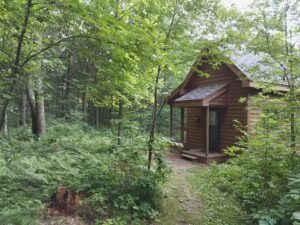 I’ve never been to Pacem in Terris in the spring before. I’ve always gone in the fall or winter. There is no electricity in the hermitages, no running water. A delicious basket of homemade bread, some fruit and cheese, along with gallons of fresh water are provided for each hermit. I don’t take much with me. Clothes to walk in, a warm flannel nightgown to sleep in, my journal and smallest Bible. I am ashamed to say I know it will be unnatural for me to leave my cell phone in my car, but I will. I haven’t been completely unplugged for years and that fact in itself tells me how out of order my life is.
I’ve never been to Pacem in Terris in the spring before. I’ve always gone in the fall or winter. There is no electricity in the hermitages, no running water. A delicious basket of homemade bread, some fruit and cheese, along with gallons of fresh water are provided for each hermit. I don’t take much with me. Clothes to walk in, a warm flannel nightgown to sleep in, my journal and smallest Bible. I am ashamed to say I know it will be unnatural for me to leave my cell phone in my car, but I will. I haven’t been completely unplugged for years and that fact in itself tells me how out of order my life is.
Have you ever been to Pacem? Or a retreat center like it? What was it like for you?
God’s peace to you,
Wednesday’s Word — Edition 146
March 24, 2021 | My Jottings
The Trailer on the Banks of the Yuba
March 19, 2021 | My Jottings
My first home as a married woman was an old three-room trailer on the banks of the Yuba River in Smartville, California.
I remember the day Glenn and I answered the ad, and drove down the rutted, dirt driveway from Highway 20 in the foothills of the Sierra Nevada mountains. The trailer measured 8 feet by 48 feet, and its dented metal sides were yellow on the top half and a dusty mustard on the bottom. Two wooden steps led to the door that opened into the tiny living room that smelled of years.
There was thin, stained avocado green carpet with no padding underneath. Plastic curtains with a swirly green print hung on pencil thin rods above the windows. Glenn and I could both touch the ceiling without fully extending our arms.
Six inches from the living room, a worn yellow Formica table with chrome and vinyl chairs from the 50s sat on one side of the narrow kitchen, under a large window that looked over a neglected, weedy garden, and up onto the highway. Across from the table was a big gas stove that had to be lit with a match, a few cabinets with just enough room for the dinnerware from my hope chest, and above the sink was a small window that looked out onto the winding Yuba, where miners had panned for gold a century before.
The closet-sized bathroom off the kitchen had a sky blue tub encrusted with rust, a leaning toilet and a mixing bowl-sized sink. Someone had pressed contact paper with a blue and white design on the walls above the sink, but left the air bubbles that were trapped underneath. The shallow tub would require one to sit straight with knees bent to have a bath.
The bedroom was at the end of the trailer, and would just barely fit our double bed and tiny nightstand. We could see that whoever slept farthest from the door would have to crawl over the other to get to the bathroom.
The place had seen better days but it was near the woods, had a view of water, we were in love, and the rent was $75.00 per month; we moved in right after Christmas of 1975. Glenn was 21 and I was 18.
While Glenn drove the twenty-five minutes each day to work for the United States Air Force, I housewifed. I set up the ironing board in the tiny living room while I listened to Fleetwood Mac and James Taylor albums on the turntable we had put on the shelf above the couch. I ironed Glenn’s uniforms; green fatigues and dress blues, depending on the day or military event. I had a basic Kenmore sewing machine and I placed it on the coffee table and sewed caftans for myself and a few Hawaiian shirts for Glenn. I swept the steps, Pledged the furniture, made throw pillows for our little plaid couch, and learned to cook.
I asked Glenn’s mother for his favorite recipe of pepper steak and rice, and one afternoon when I had the car, I thought if I left the gas burner under the skillet on low, all the savory liquid would be soaked up perfectly by the time I returned from picking Glenn up from work. When we walked in the door about forty-five minutes later, we were assaulted by the smoke from carbonized bits of beef and black, charred rice that had become one with the bottom of the pan.
We used to walk down to the river in the evenings, and I waded around the shallows while Glenn tried his hand at panning for gold.
To our left and down some was a two bedroom house rented by Sam and Janis, two fabulously creative hippies from Shepherdstown, West Virginia, who owned several Nubian goats and had a child’s antique coffin in their living room. I learned to milk a doe and castrate a baby buck with a rubber band, but the taste of goat stew was something I never fancied.
To our right and up the hill was a newer and roomier trailer, where Joe and Dilly Poindexter, the antithesis of Sam and Janis, had come from Southern California to retire. Dilly fried her hamburger patties in Crisco shortening and Joe smiled out of the side of his mouth, smoked cigars and drove a long, low gold colored Cadillac.
We only lived in our skinny little trailer for half a year before a three bedroom house became available on the base. Four years, two continents, and two daughters later, Glenn decided to look for gold elsewhere, and thought he could holler “Eureka!” with Karla. She turned out to be pyrite and I wasn’t too terribly heartbroken to hear of it.
I looked at that same trailer yesterday on Google Earth, and was able to zoom in from a street view to see it hasn’t changed much. Weeds skirted the base of it and the dwindling Yuba meandered 50 yards from the front door.
I remembered how tiny our home was, how flimsy and make-believe everything inside seemed, including our marriage, now that I have the perspective of 40 years. Plastic curtains and vows, veneer walls and words, mice and women coming into our midst through the cracks we didn’t know how to seal.
Psalm 18:19 says, “He brought me out into a spacious place, He rescued me because He delighted in me,” and the hope and truth of this verse came to pass in my life, with another man whose vows were made of rock, another home with curtains of real cloth, and another place entirely, yet one where I can still see water from my kitchen window.
Water
March 17, 2021 | My Jottings
From the archives…
One of my earliest memories is when I first saw our new house on Eckerman Avenue in West Covina, California. I was almost three years old. I was holding onto the side slats in a rented, open tow-trailer being pulled by our 1960 copper-colored Buick LeSabre station wagon. We slowed to a stop in front of the three-bedroom ranch-style home numbered 1923. My dad was driving, my mom was in the passenger seat, my thirteen year-old brother Steve steadied me in the trailer, and our aging family dog Duchess sat with us among the boxes.
The house had the garage in front, so common in California, with a curved driveway, and had yellow stucco with brown shutters and trim. Later the house was grey with turquoise trim, then when I was a teen we had it painted mustard with avocado trim.
There were nine houses on our street and I would eventually come to know every family. The Pelchers, Bouchards, Langs, Sooters, O’Neals, Spiros, Prestons, Rathfons and Wepplos.
Across from our sleepy street was the back field and running track of Traweek Junior High School. Just inside the tall chain link fence surrounding the school block was a line of towering eucalyptus trees. For years I ran, skateboarded, biked, and later motor-scootered up and down the sidewalk and street under them; I can hardly recall a childhood memory without picturing the slender shadows of those trees, or how they filled my bedroom with the scent of Vicks Vap-o-rub when the Santa Ana winds blew.
I made my first friend when we lived on Eckerman Avenue. Her name was Tauni Booth, and she lived directly behind me in a house just like ours, except the floor plan was reversed. Tauni’s family was one of four on our block who had a built in pool. After I learned to swim at the Covina Park Plunge when I was five years old, being in the water was all I wanted to do. I took an old, rusty step stool from our garage and dragged it to the far left corner of our back yard, where I placed it against the pink concrete block wall that divided Tauni’s house from mine. When my chores were done I’d climb that stool and sit conspicuously on the top of the wall, hoping one of the Booths would come out to swim and invite me over. Many times they did; I must have spent hundreds of hours in their refreshing turquoise heaven. I never knew it was impolite and presumptuous to perch up on that wall, watching them swim and putting my yearning on display like that.
Over the years my love for water deepened, as did the waters in which I swam. Swimmer’s earache, raisin fingers, and burning lungs from the mix of smog and chlorine never deterred me. I swam whenever it was possible, and by the age of ten I was swimming out past the big breakers at Huntington Beach, then pouting when the sun would begin to set and my parents would say it was time to make the hour-long drive home.
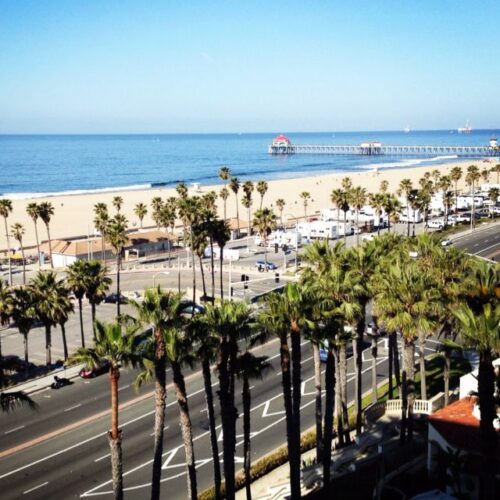 At the beach my parents always wore their regular clothes; I was a lone participant in my swimming passion. Mom usually sat in the car and people watched, and Dad walked to the water’s edge with me and eventually sat in the sand.
At the beach my parents always wore their regular clothes; I was a lone participant in my swimming passion. Mom usually sat in the car and people watched, and Dad walked to the water’s edge with me and eventually sat in the sand.
I used to tell him to raise his arm way up in the air when he thought I’d swum out a mile. I didn’t know then that he wasn’t about to go along with that, but he let me believe he would. I would run into the greenish gray, opaque surf, wade past the littlest waves, front crawl past the bigger waves and the waiting surfers astride their boards, and just keep swimming. I would swim ten or fifteen strokes, and then tread water and look back toward the beach. There was my father in his brown pants and white sport-shirt, legs wide and knees bent, with both arms resting on his knees, watching me. I’d turn and swim toward the horizon again, noticing the pockets of warmer water here and there in the cold. My feet would brush against the slimy bulbs from the Pacific kelp forest and I would always shudder and hurry to swim away from them. This was before the movie Jaws, so the kelp forest seemed like the greatest menace I faced. A shark never entered my mind, nor my father’s, apparently. Swim… turn around again… look for his signal, repeat. I was certain I was a mile out because his shirt looked like a white dot against his dark pants now. There was his long arm raised above his head, slowly waving in a left-to-right arc, telling me I had reached the mile point.
Before I swam back to shore I always took a deep breath, squinched my eyes tight against the salt, and dove down, down, down, to see how deep the water was. When I couldn’t touch the bottom I was satisfied I had gone far enough.
I liked coming home to the yellow house on Eckerman Avenue even though it didn’t have a pool. After a day of hard swimming in Tauni’s pool or in the mighty Pacific, I’d make a Skippy peanut butter and Welch’s grape jelly sandwich and settle down with a Nancy Drew book in my pink bedroom with the white poodle lamp on my nightstand.
Years later it felt like the ground beneath that house opened up to devour our family, and we all moved away in separate directions, never to be truly mended.
Today I’m still irresistibly drawn to water. I don’t swim as much as I used to, but every morning I sit in my dining room and look longingly out onto the largest freshwater lake in the world.
Sometimes I wonder what it would be like to swim a mile out, and not look back.
Verna Needs Some Verve — My Kidney Donation, Part 7
March 14, 2021 | My Jottings
In late January I went down to the Mayo Clinic in Rochester, MN to have my six month post-nephrectomy checkup. We needed to see how Verna was handling things on her own.
I donated my left kidney Justine to an unknown person in Madison, WI on August 5, 2020, and now I will be checked at six months, one year, and two years at Mayo, then yearly after that with my own doctor. 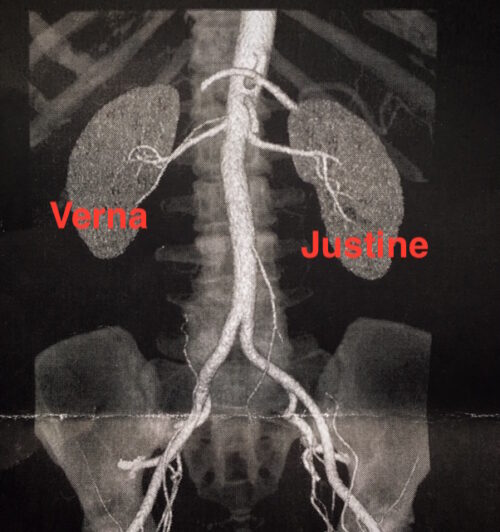
If you would like to see my last kidney donation post, click here. I still cringe when I think of nice nurse Steve and what the day started with. I thought I had prepared myself mentally for each upcoming procedure in every way possible, but no one told me part of the prep was what Steve had to do.
I had a full day of appointments beginning at 6:00 a.m. and ending at 4:30 p.m. Blood tests, urine tests, appointments with social workers, transplant team coordinators, a nephrology nurse, and a three hour kidney function test where they injected dye into my vein, gave me so many ounces to drink at certain times, then checked my urine multiple times to see how well my remaining kidney Verna functions.
One appointment was to have a continuous blood pressure monitor put on my arm and a small attached machine put in my pocket. This was to take my BP every ten minutes for five hours, so at the end of the day they could tell whether or not Verna had stepped up in Justine’s absence. That “stepping up” is called Hypertrophic Compensation, and I just knew Verna would hypertrophically compensate just fine. Usually after a living donation, the remaining kidney begins to enlarge and do more work. Sometimes the kidney actually doubles in size. I figured once Verna got over the shock of her twin leaving, she’d do what I needed her to do, which is keep my blood pressure in a normal range, make some Vitamin D and some red blood cells, filter out toxins and make urine, plus about seventy three other miraculous things I never knew kidneys did.
I was told to stop walking when the blood pressure monitor went on. There are miles to walk at a Mayo visit (I put on five miles that day) from one building to another and back again, then again and again. It was probably not convenient to any one of the people walking directly behind me when I felt the cuff inflate and I stopped where I was to try to get a quieter reading. I did step away from the walking masses as best I could, but it’s still an odd thing to manage.
At the end of the day all my tests came back and most were normal, but some were not. Hmmm. I was not expecting that. I guess I falsely presumed that since my kidney health had been so unusually good for a woman my age (or for a woman any age, apparently), I would bounce back to where I needed to be. My kidney function before donation was >90. The day after my nephrectomy it was 54, which is normal in that situation. I was told that my kidney function would never be above 60-70 again, and that people live with those numbers to old ripe ages, so 54 didn’t surprise me. What did surprise me was seeing that number fall from 54 to 51 after six months of recovery. I thought that Verna was going to enlarge and start stepping up her game, not go to sleep at the wheel.
The team assured me this was nothing to worry about at this point, which helped a bit. Then I learned that my blood pressure was a bit high. I have had very low blood pressure my whole life — usually around 115/65 or so. Now my blood pressure was in the 135-140/80-90 range. Not exactly what I wanted to hear. So I had to buy a blood pressure cuff and I’m supposed to take my pressure a few times a week to see if it goes down. I have never taken any medication other than vitamin supplements, so the thought of having to take something to lower my BP is disappointing.
Would I donate to a stranger in Madison, WI all over again, knowing what I know today? Yes I would. What they suffered before finally getting my healthy kidney Justine is nothing compared to my slightly skewed test results now. And my son-in-law Chris’s kidney is doing so well too. I gave so he could receive, in the Mayo Clinic’s Paired Donation Program, and I’m awed at the science that allowed this to happen for us.
I would like to have a word with Verna now, however.
Dearest Verna,
I was slightly vexed when I learned that you have put me in a bit of a vulnerable position now that Justine has vacated the premises.
I would like to politely ask you to cease vacillating immediately, and valiantly set to putting things right in my veins and at the various bodily vocations for which you were created. Vanquish the elevated blood pressure, Verna! Dispense with the vagary of a lowered GFR number! Renew yourself with vigor and vim, and be a renal visionary, I adjure you! Relieve me of this vague unease I have, kind Verna, and valuably assist me in voiding all unwelcome toxins in an efficient and timely manner.
Verna, you simply must grow, and generate some verve, my dear girl. I’m sure you will have news of Justine very soon.
In closing, may I remind you that your work will be verified in another six months. Take no vengeance, Verna. Do not vainly languish.
Yours very sincerely,
I’m excellent at losing things
March 8, 2021 | My Jottings
I heard from an old friend recently. He and I have exchanged a few texts and emails over the years. He went to the same high school as I did but was a few years ahead of me, so when he was playing basketball for my dad, I was a gangly and buck-toothed nine year-old. He and I have both suffered loss, and even though we’re never supposed to rate and compare others’ losses, I believe his is the kind that carves a deep valley into a soul, never to fill up again. At least on this earth. He is a man of strong faith, so I know he knows where Comfort comes from, but even so. I think there are wounds and gashes that just won’t be made better until we are with Jesus beyond this earth someday. There is a kernel of peace in accepting that.
The people I’ve known who don’t accept that pain and loss must eventually arrive on our doorsteps, the ones who think God should come through for them, seem to always wonder why He isn’t and when He will and what have they done that no relief comes.
I point the finger at no soul. I too, have wondered why my prayers seem to be too faint or anemic to reach God’s ears, or worse, why He would hear my sobs and see my blotchy face, and not rush to help me when I was in such anguish. I understand a tiny bit about wondering.
I have also experienced beautiful and breathtaking answers to prayer. God has been extraordinarily merciful to me.
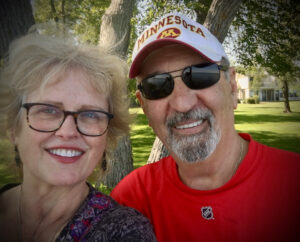 There are some losses that show up without even giving us the courtesy of being able to steel ourselves against them. A dread disease shuts down a young and vital body. A hurtling car severs nerves and mobility is lost. A long marriage, a secure job, the sense of smell, a beloved pet; who doesn’t know someone who has had to learn to navigate life when something or someone previously depended on is gone?
There are some losses that show up without even giving us the courtesy of being able to steel ourselves against them. A dread disease shuts down a young and vital body. A hurtling car severs nerves and mobility is lost. A long marriage, a secure job, the sense of smell, a beloved pet; who doesn’t know someone who has had to learn to navigate life when something or someone previously depended on is gone?
I am very skilled at losing relationships. My first marriage ended in a pretty quick and unexpected divorce. I was almost a baby when I naively decided that marrying someone who had not been faithful to me in courtship would somehow be faithful to me in marriage. My father, God bless his soul, actually held his tongue. While that season of heartache is something I see countless riches from now (including, hello, clarity!), I still know there was heaviness and uncertainty my two little girls should have never had to bear.
I lost the relationships that could have been with my older brothers. They both had jarring issues that prevented us all from loving each other and being close siblings, but I feel my own part in those losses, how effortless it was for me to say, “They’re not well, no one can deal with them, they’re impossible. So I won’t take their calls or answer their emails.” Which, by the way, alternated between gushing with love and admiration for what a wonderful sister I was, to being told I was comparable to an ape, a sneak who literally tried to poison their food, a thief who had stolen what was theirs. I realize how insane it seems to type those words, but alas, they are true.
I always look upon those people with loving families with a mixture of wistfulness and wonder. How in the world did they do that? How do they love each other so loyally, even though they argue and get annoyed? Did their parents plant the seeds and this is the natural harvest? Was our family just warped in some way, genetically predisposed to estrangement and vitriol?
I looooove nature shows. I have wept at the mathematical skill of the plain little Japanese pufferfish, laughed with joy at mother hippos bearing their babies to the surface for a first breath, felt paralyzed by astonishment at the color variations of nudibranchs and the ability of sperm whales to kill someone with their high-decibel clicks. I gaze at the TV screen like a wonderstruck and curious child at the zoo looking through the cages, fascinated by what she sees. What does the monkey comprehend? How can the giraffe kick so accurately? Where did the otter learn her devoted, tenderly maternal ways? Why did God make so many kinds of birds? Similarly, I stand outside the unified families I’ve observed and wondered, how did they get past that trouble? How have they stuck together for so long? What makes them want to do things together long into their adulthood? Look how they celebrate and cheer one another on, in spite of their differences! How did they achieve this? Some have had their Christian faith as the glue. Some have claimed their mother or father as the core. Others grew close because of family hardships as they were growing up.
All I know, is it has never happened with my family. I am the only one left now. My parents have both passed on, and my older brothers died in 2016 and 2020. I exaggerate not by saying they both left wreckage in their wakes. So in some ways, I’ve absolved myself of the loss of whatever relationship could have been built with my brothers, because there wasn’t a lot of stability there for a foundation.
But now I’m thinking of the loss of friends. Have you ever lost a friend and been surprised by it? I have. One time I lost a treasured friend for a few years and then God restored the friendship. I tried to learn from it and asked God to help me humble myself through the suffering and shock. Our relationship today is a blessing to me.
I lost another friendship several years ago without a word of explanation. She moved away and never contacted me again. That one was perplexing for a time, but not painful, because there were non-nurturing things she would say that I knew I was better off without.
I lost a friendship a few years ago I thought would exist until one of us died. Decades of close friendship, cards from her saying I was her dearest friend, countless phone calls sharing our lives, walking each other through valleys of death, a warm, reliable and helping hand by my side in some of my darkest times. I looked back recently over our years and years of text messages, sharing laughter and tears and the minutiae of our ordinary lives.
And then, it was done.
Contact became sporadic. Eventually my texts went unanswered. Closure is always helpful, so I wrote to reverently and sorrowfully pile up some stones of remembrance into an altar for our thirty-plus years of friendship. She wrote back and graciously told me that yes, she was laying down our friendship for a number of reasons. Some of the things she told me I’d done, she had done to me years before, yet I’d honestly let them go and thought little of them, because we were friends and she was hurting. She didn’t know. And what I had done was careless and never ill-intentioned. If she had approached me about it, I’m pretty sure I could have received it and tried to remedy it. She didn’t think we were worth remedying.
If there was one thing I learned the hard way in my family growing up, you don’t cast people aside. You don’t jettison a relationship because it gets turbulent. I hadn’t even known we were in a rough patch. Maybe I was a little self-focused and self-pitying because Michael had died after being pounded by Parkinsons and Lewy Body Dementia for years. Maybe I was difficult. The sad thing is, I didn’t know I was. That’s what is unsettling to me. I didn’t know that me being me was so challenging, that a faithful friend just couldn’t take it anymore.
I am the common denominator in these losses. I say it out loud and as humbly as I know how. I have a lot to learn. I am trying to learn. I apologize frequently and sincerely. I ask God to change me, and to help me cooperate with what He would like to do in my life.
But I can feel that I am altered. I emote less. I speak my mind in a frank manner much more infrequently and have an internal knee-jerk reaction when I do, like “Oh, why did you say that?! You should have just kept quiet!”
I used to go deep, now I dog paddle closer to the surface. Talk to me about recipes, Netflix series, weather patterns and books.
It’s an odd and deadening thing to feel that the person I am deep inside, all lumps of dirty coal and a few little sparkly jewels that do occasionally reflect His light, in a very short period of time, could be forgotten. Pushed away. Never spoken to again. Contemptible, even.
And oh — the photo above is Lloyd and me, last summer, near Mille Lacs Lake, MN.
